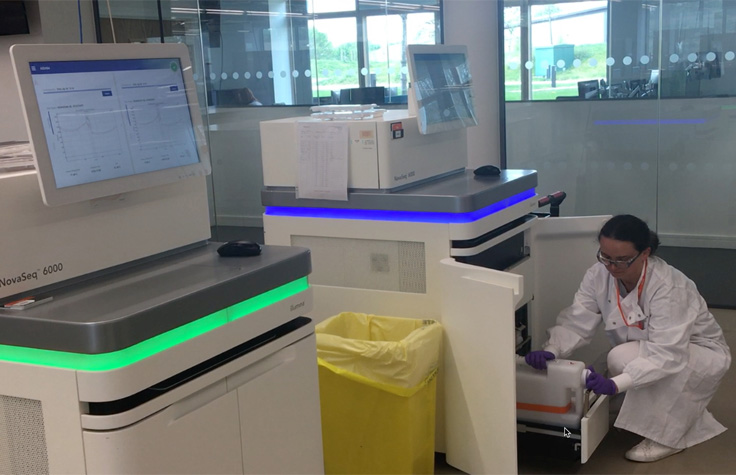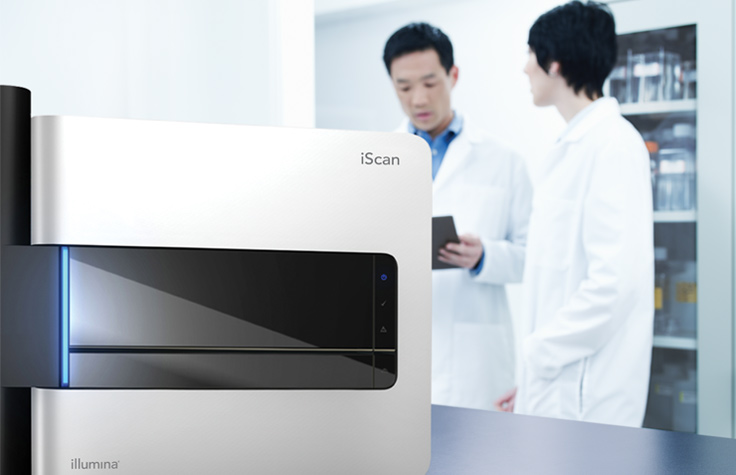High-Throughput Genomics
Advancing Large-Scale Genetic Analysis
Researchers are harnessing the power of high-throughput genomics to conduct large-scale, global genetic analyses. This research often focuses on multifactorial genetic discovery of disease risk markers, and may involve looking for changes in genetic variants such as single nucleotide polymorphisms (SNPs), indels, splice variants, structural variants, and methylation markers.
High-throughput genomics studies with tens to hundreds of thousands of samples require fast, cost-effective tools. Illumina offers genomic analysis technologies with comprehensive sample-to-analysis solutions and exceptional collaborative expertise to meet the needs of high-throughput labs.
Technologies for High-Throughput Genomics
Sequencing by synthesis technology detects single bases as they are incorporated into growing DNA strands, allowing scientists to fully characterize any genome.
BeadArray microarray technology offers trusted data quality and exceptional coverage of valuable genomic regions, making Illumina arrays the platform of choice by leading institutions for large-scale genotyping and drug discovery projects.

High-Throughput Approaches for Prioritizing Functional Genetic Variants
Recent technological advances have allowed for the development of high-throughput genomics-based strategies to assay GWAS SNPs for potential functional relevance. Powerful combinations of high-throughput experimental assays, single-cell approaches, and computational analyses are accelerating the ability to link variants to function, and, by extension, link genotype to phenotype.
View Webinar
Featured High-Throughput Genomics Solutions
High-Throughput Sequencing
Process more samples to improve statistical power. Cost-effectively run data-rich multiomics applications using the latest large-scale sequencers.
High-Throughput Genotyping
Large-scale genotyping with microarrays can identify variants associated with disease risk in large cohorts or populations.
Bioinformatics Pipeline Setup
Find information and resources to help simplify the process of setting up an informatics infrastructure and data analysis pipeline.
Laboratory Information Management Systems
Learn how you can benefit from a LIMS optimized for genomics, and find out what features to look for.
Library Prep Automation
For labs preparing large quantities of sequencing libraries, liquid-handling robots and other automation solutions provide a good option.
Multiplex Sequencing
Sample multiplexing allows large numbers of libraries to be pooled and sequenced simultaneously during a single sequencing run.
Hear From High-Throughput Genomics Labs

Establishing and Scaling an Efficient Genotyping Facility
Prenetics created a high-throughput microarray-based genotyping laboratory to serve its growing customer base in Southeast Asia.
Read Article
Value of a Panomics-Based Drug Discovery Approach
A large international study integrates genomics with transcriptomics, methylomics, proteomics, metabolomics, and more to uncover targets for common chronic diseases.
Read Interview
Scaling Up to Genotype Thousands of Samples
Resource planning and automated genotyping workflows allowed GPBio to achieve immediate efficiency and throughput gains.
Read ArticleRelated Solutions
Complex Disease Genomics
Genomic technologies are introducing new avenues for understanding complex disease etiology on a molecular level.
Population Genomics
National population genomics programs seek to integrate large, diverse data sets, combining clinical information with genomic data at scale.
Genome-Wide Association Studies
These studies use high-throughput genomics to quickly scan entire genomes, to find genetic variants linked to a disease or trait.
Multiomics
Combine genomic data with data from other modalities such as transcriptomics, epigenetics, and proteomics, to measure gene expression, gene activation, and protein levels.
Interested in receiving newsletters, case studies, and information on complex disease genomics? Please enter your email address.
Additional Resources

Drug Discovery and Development
NGS can help pharmaceutical scientists identify potential drug targets and support development of targeted therapies.